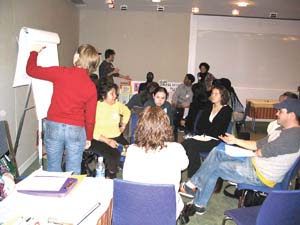Applying the theoretical knowledge of the college classroom to the post-graduate real world may prove to be an easier transition for some College of Public and Community Service students. Last semester students enrolled in Professor Joan Arches’ Strategy and Proposal Development course that coupled the insights of their texts and classroom lecture with practical knowledge as they set out to assess student involvement with UMB’s proposed Community Outreach and Research Center (CORC). Arches, along with her students, presented their process and findings to members of UMass Boston and visiting educators at the Center for Improvement of Teaching Conference held last Friday afternoon in McCormack Hall.
“This project really was student-driven and student-run,” said Arches, who also acts as co-principle investigator of the Department of Housing and Urban Development Community Outreach Partnership Center grant that spurred the creation on the CORC.
The CORC was described by Dr. Rob Beattie, Director of the Environmental Studies Program and co-principle investigator of the grant as “sort of a portal… Where members of the community, be it community groups or individuals could come and find out about the kinds of resources that the university offers both educational research services activities, and it will be a center at which university faculty and staff could make connections with community groups or with one another.”
In conjunction with the Urban Mission Coordinating Committee, Arches and Beattie took part in the Urban Connections Forum this past October in order to galvanize faculty, staff, and administration around the project. As their contribution to the project, Arches’ students focused on student involvement in the creation of the CORC. One week into their coursework the class wrote and then received a grant to facilitate their work. After classroom brainstorming sessions the class planned and executed a student forum to address issues involved in the types of service learning projects that could emerge in creating this meeting point for community organizations, faculty, and students.
“One of the amazing things was how we managed to pull together a grant in five days and a proposal by the end of the semester…When Joan told us about the grant we split it up into pieces and took it home…we worked really well together,” said student Meghan Doran who acted as the class editor for the grant and the proposal based on their findings which is set to be presented to the head of the Urban Mission Coordinating Committee, Chancellor Keith Motley.
Issues regarding scheduling conflicts, course credit, and accessibility were among those addressed at the Engaging Student Voices Forum held in the Campus Center on November 18. In addition to a lecture on service learning and a talk given by a representative from the CORC community partner Harbor Point non-profit Geiger-Gibson Healthcare, the forum polled student representatives from each of the colleges within the University. Arches’ Strategy and Proposal Development students acted as both facilitators and note-takers for group discussions addressing student concerns with service learning projects.
“The ultimate goal for each group was to talk briefly about what the CRC might look like …and compile a list of findings from that,” said Matt Landry, a class member and student senator whose student government connections were put to use in networking for planning the event.Following the forum, Arches’ students regrouped in the classroom to compile their information into a forty-page proposal to the Urban Mission Coordinating Committee.
“This class automatically broke down into their own roles based on their strengths,” said Arches”It really set a fire under us. It really brought us together as a class,” said Doran. “It was like okay, we all did this, we’re responsible for something beyond our class work,” she continued citing Arches motivation and ability to allow her students to take control of the project both in and out of the classroom as an impetus.
Faculty from UMB and elsewhere that attended the class presentation during the Center for Improvement of Teaching Conference were impressed. One visiting professor commented on the class as an example of the way in which coupling service learning with class time gives students a knowledge beyond the “stock knowledge of college graduates” and better prepares them for the realities of the workplace.Arches students agree that the addition of the project to their course work was beneficial. They cite a knowledge of service learning, outreach, public speaking, group management, event planning, grant and proposal writing, and the workings of the university as skills they have acquired as a result of the project.
“I think it was really good to do something for the school’s advancement as a whole,” said senior CPCS student Liz Elia, adding, “I’m really excited to get out there and show the kind of work we’re able to do in CPCS. Working together as a group we all became really close. It was really enjoyable to do.”
Although their Strategy and Proposal Development course came to an end at the close of the fall 2004 semester Arches says her students may choose to continue their work through independent study. “The project lasted for just one semester as a class, but because the grant can continue there’s a way to really keep it going,” said Arches.”For people who are interested in learning about innovative and really positive ways of teaching, I thought it would be really great to hear about this kind of teaching from the student perspective,” said Arches of her class’s participation in the conference. “It really works when it’s done right.”





















































